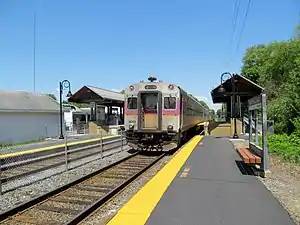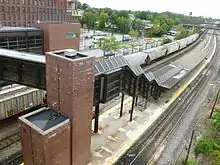Lowell Line
The Lowell Line is a railroad line of the MBTA Commuter Rail system, running north from Boston to Lowell, Massachusetts. Originally built as the New Hampshire Main Line of the Boston & Lowell Railroad and later operated as part of the Boston & Maine Railroad's Southern Division, the line was one of the first railroads in North America and the first major one in Massachusetts.
| Lowell Line | |||||||||||||||||||||||||||||||||||||||||||||||||||||||||||||||||||||||||||||||||||||||||||||||||||||||||||||||||||||||||||||||||||||||||||||||||||||||||||||||||||||||||||||||||||||||||||||||||||||||||||||||||||||||||||||||||||||||||||||||||||||||||||||||||||||||||||||||||||||||||||||||||||||||||||||||||||||||||||||||||||||||||||||||||||||||||||||||||||||||||||
|---|---|---|---|---|---|---|---|---|---|---|---|---|---|---|---|---|---|---|---|---|---|---|---|---|---|---|---|---|---|---|---|---|---|---|---|---|---|---|---|---|---|---|---|---|---|---|---|---|---|---|---|---|---|---|---|---|---|---|---|---|---|---|---|---|---|---|---|---|---|---|---|---|---|---|---|---|---|---|---|---|---|---|---|---|---|---|---|---|---|---|---|---|---|---|---|---|---|---|---|---|---|---|---|---|---|---|---|---|---|---|---|---|---|---|---|---|---|---|---|---|---|---|---|---|---|---|---|---|---|---|---|---|---|---|---|---|---|---|---|---|---|---|---|---|---|---|---|---|---|---|---|---|---|---|---|---|---|---|---|---|---|---|---|---|---|---|---|---|---|---|---|---|---|---|---|---|---|---|---|---|---|---|---|---|---|---|---|---|---|---|---|---|---|---|---|---|---|---|---|---|---|---|---|---|---|---|---|---|---|---|---|---|---|---|---|---|---|---|---|---|---|---|---|---|---|---|---|---|---|---|---|---|---|---|---|---|---|---|---|---|---|---|---|---|---|---|---|---|---|---|---|---|---|---|---|---|---|---|---|---|---|---|---|---|---|---|---|---|---|---|---|---|---|---|---|---|---|---|---|---|---|---|---|---|---|---|---|---|---|---|---|---|---|---|---|---|---|---|---|---|---|---|---|---|---|---|---|---|---|---|---|---|---|---|---|---|---|---|---|---|---|---|---|---|---|---|---|---|---|---|---|---|---|---|---|---|---|---|---|---|---|---|---|---|---|---|---|---|---|---|---|---|---|---|---|---|---|---|---|---|---|---|---|
 An outbound Lowell Line train at North Billerica station | |||||||||||||||||||||||||||||||||||||||||||||||||||||||||||||||||||||||||||||||||||||||||||||||||||||||||||||||||||||||||||||||||||||||||||||||||||||||||||||||||||||||||||||||||||||||||||||||||||||||||||||||||||||||||||||||||||||||||||||||||||||||||||||||||||||||||||||||||||||||||||||||||||||||||||||||||||||||||||||||||||||||||||||||||||||||||||||||||||||||||||
| Overview | |||||||||||||||||||||||||||||||||||||||||||||||||||||||||||||||||||||||||||||||||||||||||||||||||||||||||||||||||||||||||||||||||||||||||||||||||||||||||||||||||||||||||||||||||||||||||||||||||||||||||||||||||||||||||||||||||||||||||||||||||||||||||||||||||||||||||||||||||||||||||||||||||||||||||||||||||||||||||||||||||||||||||||||||||||||||||||||||||||||||||||
| Status | Operational | ||||||||||||||||||||||||||||||||||||||||||||||||||||||||||||||||||||||||||||||||||||||||||||||||||||||||||||||||||||||||||||||||||||||||||||||||||||||||||||||||||||||||||||||||||||||||||||||||||||||||||||||||||||||||||||||||||||||||||||||||||||||||||||||||||||||||||||||||||||||||||||||||||||||||||||||||||||||||||||||||||||||||||||||||||||||||||||||||||||||||||
| Owner | Massachusetts Bay Transportation Authority | ||||||||||||||||||||||||||||||||||||||||||||||||||||||||||||||||||||||||||||||||||||||||||||||||||||||||||||||||||||||||||||||||||||||||||||||||||||||||||||||||||||||||||||||||||||||||||||||||||||||||||||||||||||||||||||||||||||||||||||||||||||||||||||||||||||||||||||||||||||||||||||||||||||||||||||||||||||||||||||||||||||||||||||||||||||||||||||||||||||||||||
| Locale | Northeastern Massachusetts | ||||||||||||||||||||||||||||||||||||||||||||||||||||||||||||||||||||||||||||||||||||||||||||||||||||||||||||||||||||||||||||||||||||||||||||||||||||||||||||||||||||||||||||||||||||||||||||||||||||||||||||||||||||||||||||||||||||||||||||||||||||||||||||||||||||||||||||||||||||||||||||||||||||||||||||||||||||||||||||||||||||||||||||||||||||||||||||||||||||||||||
| Termini | Lowell North Station | ||||||||||||||||||||||||||||||||||||||||||||||||||||||||||||||||||||||||||||||||||||||||||||||||||||||||||||||||||||||||||||||||||||||||||||||||||||||||||||||||||||||||||||||||||||||||||||||||||||||||||||||||||||||||||||||||||||||||||||||||||||||||||||||||||||||||||||||||||||||||||||||||||||||||||||||||||||||||||||||||||||||||||||||||||||||||||||||||||||||||||
| Stations | 9 | ||||||||||||||||||||||||||||||||||||||||||||||||||||||||||||||||||||||||||||||||||||||||||||||||||||||||||||||||||||||||||||||||||||||||||||||||||||||||||||||||||||||||||||||||||||||||||||||||||||||||||||||||||||||||||||||||||||||||||||||||||||||||||||||||||||||||||||||||||||||||||||||||||||||||||||||||||||||||||||||||||||||||||||||||||||||||||||||||||||||||||
| Service | |||||||||||||||||||||||||||||||||||||||||||||||||||||||||||||||||||||||||||||||||||||||||||||||||||||||||||||||||||||||||||||||||||||||||||||||||||||||||||||||||||||||||||||||||||||||||||||||||||||||||||||||||||||||||||||||||||||||||||||||||||||||||||||||||||||||||||||||||||||||||||||||||||||||||||||||||||||||||||||||||||||||||||||||||||||||||||||||||||||||||||
| Type | Commuter rail | ||||||||||||||||||||||||||||||||||||||||||||||||||||||||||||||||||||||||||||||||||||||||||||||||||||||||||||||||||||||||||||||||||||||||||||||||||||||||||||||||||||||||||||||||||||||||||||||||||||||||||||||||||||||||||||||||||||||||||||||||||||||||||||||||||||||||||||||||||||||||||||||||||||||||||||||||||||||||||||||||||||||||||||||||||||||||||||||||||||||||||
| System | MBTA Commuter Rail | ||||||||||||||||||||||||||||||||||||||||||||||||||||||||||||||||||||||||||||||||||||||||||||||||||||||||||||||||||||||||||||||||||||||||||||||||||||||||||||||||||||||||||||||||||||||||||||||||||||||||||||||||||||||||||||||||||||||||||||||||||||||||||||||||||||||||||||||||||||||||||||||||||||||||||||||||||||||||||||||||||||||||||||||||||||||||||||||||||||||||||
| Operator(s) | Keolis North America | ||||||||||||||||||||||||||||||||||||||||||||||||||||||||||||||||||||||||||||||||||||||||||||||||||||||||||||||||||||||||||||||||||||||||||||||||||||||||||||||||||||||||||||||||||||||||||||||||||||||||||||||||||||||||||||||||||||||||||||||||||||||||||||||||||||||||||||||||||||||||||||||||||||||||||||||||||||||||||||||||||||||||||||||||||||||||||||||||||||||||||
| Daily ridership | 10,625 (2018)[1] | ||||||||||||||||||||||||||||||||||||||||||||||||||||||||||||||||||||||||||||||||||||||||||||||||||||||||||||||||||||||||||||||||||||||||||||||||||||||||||||||||||||||||||||||||||||||||||||||||||||||||||||||||||||||||||||||||||||||||||||||||||||||||||||||||||||||||||||||||||||||||||||||||||||||||||||||||||||||||||||||||||||||||||||||||||||||||||||||||||||||||||
| History | |||||||||||||||||||||||||||||||||||||||||||||||||||||||||||||||||||||||||||||||||||||||||||||||||||||||||||||||||||||||||||||||||||||||||||||||||||||||||||||||||||||||||||||||||||||||||||||||||||||||||||||||||||||||||||||||||||||||||||||||||||||||||||||||||||||||||||||||||||||||||||||||||||||||||||||||||||||||||||||||||||||||||||||||||||||||||||||||||||||||||||
| Opened | 1835 (Boston & Lowell Railroad) | ||||||||||||||||||||||||||||||||||||||||||||||||||||||||||||||||||||||||||||||||||||||||||||||||||||||||||||||||||||||||||||||||||||||||||||||||||||||||||||||||||||||||||||||||||||||||||||||||||||||||||||||||||||||||||||||||||||||||||||||||||||||||||||||||||||||||||||||||||||||||||||||||||||||||||||||||||||||||||||||||||||||||||||||||||||||||||||||||||||||||||
| Technical | |||||||||||||||||||||||||||||||||||||||||||||||||||||||||||||||||||||||||||||||||||||||||||||||||||||||||||||||||||||||||||||||||||||||||||||||||||||||||||||||||||||||||||||||||||||||||||||||||||||||||||||||||||||||||||||||||||||||||||||||||||||||||||||||||||||||||||||||||||||||||||||||||||||||||||||||||||||||||||||||||||||||||||||||||||||||||||||||||||||||||||
| Line length | 25.4 miles (40.9 km)[2] | ||||||||||||||||||||||||||||||||||||||||||||||||||||||||||||||||||||||||||||||||||||||||||||||||||||||||||||||||||||||||||||||||||||||||||||||||||||||||||||||||||||||||||||||||||||||||||||||||||||||||||||||||||||||||||||||||||||||||||||||||||||||||||||||||||||||||||||||||||||||||||||||||||||||||||||||||||||||||||||||||||||||||||||||||||||||||||||||||||||||||||
| Character | Elevated and surface-level | ||||||||||||||||||||||||||||||||||||||||||||||||||||||||||||||||||||||||||||||||||||||||||||||||||||||||||||||||||||||||||||||||||||||||||||||||||||||||||||||||||||||||||||||||||||||||||||||||||||||||||||||||||||||||||||||||||||||||||||||||||||||||||||||||||||||||||||||||||||||||||||||||||||||||||||||||||||||||||||||||||||||||||||||||||||||||||||||||||||||||||
| Track gauge | 4 ft 8 1⁄2 in (1,435 mm) | ||||||||||||||||||||||||||||||||||||||||||||||||||||||||||||||||||||||||||||||||||||||||||||||||||||||||||||||||||||||||||||||||||||||||||||||||||||||||||||||||||||||||||||||||||||||||||||||||||||||||||||||||||||||||||||||||||||||||||||||||||||||||||||||||||||||||||||||||||||||||||||||||||||||||||||||||||||||||||||||||||||||||||||||||||||||||||||||||||||||||||
| |||||||||||||||||||||||||||||||||||||||||||||||||||||||||||||||||||||||||||||||||||||||||||||||||||||||||||||||||||||||||||||||||||||||||||||||||||||||||||||||||||||||||||||||||||||||||||||||||||||||||||||||||||||||||||||||||||||||||||||||||||||||||||||||||||||||||||||||||||||||||||||||||||||||||||||||||||||||||||||||||||||||||||||||||||||||||||||||||||||||||||
All stations are accessible except for West Medford, Winchester Center, and Mishawum.
History
.JPG.webp)

The Boston & Lowell Railroad started freight operations in 1835, with traffic from the Lowell mills to the Boston port. Demand for the express passenger service exceeded expectations, and in 1842 local service was added as well. The line north of Lowell was first owned by the Boston, Concord & Montreal Railroad, which was chartered in 1844. Trackage was completed as far as Wells River, Vermont, in 1853. The Boston & Maine Railroad (B&M) acquired the railroad in 1895.[3][4] The line served as the route for Boston to Montreal service during the Golden Age of Rail (roughly 1880 to 1940). The Ambassador, the train from Boston's North Station to Montreal, ran through Concord, New Hampshire, along this line until 1966.[5] This line, along with the New Englander, via Concord, White River Junction, Montpelier, ran through the northwestern section of Vermont prior to entering Quebec, Canada. The Alouette and Red Wing trains travelled to Montreal via Concord, Plymouth, Wells River and Newport in northeastern Vermont prior to entering Quebec. (The route via Wells River, St. Johnsbury and Newport was the more direct route of the two itineraries.)[6] For this itinerary the Montreal route was marketed as an Air-line railroad.
B&M passenger service to Boston on the line was shortened from Concord, New Hampshire to Lowell in 1967.[7]
In 1973, the MBTA bought the Lowell line, along with the Haverhill and all other local Greater Boston passenger lines. Along with the sale, the B&M contracted to run the passenger service on the Lowell line for the MBTA. After bankruptcy, the B&M continued to run and fulfill its commuter rail contract under the protection of the United States Bankruptcy Court, in the hopes that a reorganization could make it profitable again. It emerged from the court's protection when newly formed Guilford Transportation Industries (GTI) purchased it in 1983.
For approximately thirteen months in 1980-81, daily passenger service was provided to Concord. Two round-trips were operated on each weekday and one on weekend days. Originally, there were intermediate stops in Manchester and Nashua. A stop in Merrimack was added later. Service was discontinued when federal funding was withdrawn.[8]
Anderson Regional Transportation Center opened on April 28, 2001, replacing Mishawum as the Lowell Line's primary park-and-ride station for Route 128. Mishawum was reduced to limited reverse-peak service.[9] On December 15, 2001, the Amtrak Downeaster began operating over the line south of Wilmington.[9] In October 2006, the MBTA added four short turn round trips that terminated at Anderson RTC.[10]
The line was shut down on weekends in July through September 2017 for the installation of Positive Train Control equipment in order to meet a 2020 federal deadline.[11]
The MBTA is currently building the Green Line Extension through Somerville and part of Medford. One branch of the Extension will follow the right of way of the Lowell Line into Medford. Several stations once existed along that section of the line, but none are in operation any longer.
Expansion to New Hampshire
In October 2010, the New Hampshire Department of Transportation received a $2.24 million federal grant to study an extension of the Lowell Line to Concord.[12] In January 2011, a bill was introduced into the New Hampshire legislature to end the proposed extension and give up a potential $4.1 million grant into its planning.[13] The MBTA acquired trackage rights from Pan Am in May 2011 as part of a larger transaction.[14]
In December 2020, a $5.5 million contract was awarded to AECOM for preliminary engineering and design work, environmental and public engagement services, and final design, for the project to extend MBTA commuter rail service to southern New Hampshire.[15]
Operations
Track speeds
North of Wilmington, the line is authorized for a maximum of 60 miles per hour (97 km/h). South of Wilmington, the line has an unusual asymmetrical speed limit. The northbound track supports up to 70 miles per hour (110 km/h) where curvature allows, while the southbound track has a maximum of 60 miles per hour (97 km/h). Additional speed restrictions are in place at Wilmington, through the grade crossings in West Medford, and in the North Station terminal area.[16]
Other services
Amtrak's Downeaster service to Maine, along with some Haverhill Line express trains, run on the Lowell Line from North Station to Wilmington, then follow the Wildcat Branch to the Haverhill Line. This routing is used to avoid the inner Haverhill Line, which has a number of single-track sections.
The line is the designated freight clearance route into Boston from the north; all stations with high-level platforms must either have mini-high platforms or a freight passing track. Pan Am Railways runs freight on the line, including local freights based out of Lawrence Yard and DOBO (a Dover to Boston through freight).
Station listing
| State | Fare zone | Location | Mile (km)[2][17][18] | Station | Connections and notes |
|---|---|---|---|---|---|
| MA | 1A | Boston | 0.0 (0.0) | ||
| Somerville | 0.8 (1.3) | Commuter Rail Maintenance Facility | Flag stop for MBTA employees only | ||
| Medford | 4.0 (6.4) | Tufts University | Open November 1976 to October 1979; future Green Line D branch station to open in 2021 | ||
| 5.5 (8.9) | West Medford | ||||
| 1 | Winchester | 7.3 (11.7) | |||
| 7.8 (12.6) | Winchester Center | Former junction with Woburn Branch (closed 1981) | |||
| 9.0 (14.5) | Winchester Highlands | Closed June 1978[9] | |||
| Woburn | 10.5(16.9) | Walnut Hill | Closed January 18, 1965[9] | ||
| 10.9 (17.5) | Lechmere Warehouse | Open 1979 to 1996[9] | |||
| 2 | 11.6 (18.7) | Mishawum | Flag stop with limited reverse commute service | ||
| 12.7 (20.4) | |||||
| 3 | Wilmington | 15.2 (24.5) | Junction with the Wildcat Branch (used by the Downeaster and some Haverhill Line service) | ||
| 17.0 (27.4) | Silver Lake | Closed January 18, 1965[9] | |||
| Billerica | 19.2 (30.9) | East Billerica | Closed January 18, 1965[9] | ||
| 5 | 21.8 (35.1) | ||||
| 6 | Lowell | 25.5 (41.0) | |||
| Chelmsford | 28.7 (46.2) | North Chelmsford | Closed June 30, 1967 | ||
| NH | 7 | Nashua | 39.0 (62.8) | Nashua | Closed June 30, 1967; open from January 28, 1980 to March 1, 1981[9] |
| 8 | Merrimack | 46.1 (74.2) | Merrimack | Open from April 1980 to March 1, 1981[9] | |
| 10 | Manchester | 55.5 (89.3) | Manchester | Closed June 30, 1967; open from January 28, 1980 to March 1, 1981[9] | |
| 13 | Concord | 73.3 (118.0) | Concord | Closed June 30, 1967; open from January 28, 1980 to March 1, 1981[9] | |
| Currently operating station | |||||
Woburn Branch
| Fare zone | Location | Mile (km)[2][17][18] | Station | Connections and notes |
|---|---|---|---|---|
| 1 | Winchester | 7.8 mi (12.6 km) | Winchester Center | Junction with mainline |
| Woburn | 9.0 mi (14.5 km) | Cross Street | Closed February 1, 1981[19] | |
| 9.8 mi (15.8 km) | Woburn | Closed February 1, 1981[19] | ||
| Currently operating station | ||||
References
- "Commuter Rail Ridership Counts" (PDF). Massachusetts Bay Transportation Authority. January 28, 2019.
- "Ridership and Service Statistics" (PDF) (14th ed.). Massachusetts Bay Transportation Authority. 2014.
- "Boston, Concord & Montreal Railroad waymark". Waymarking. 19 April 2007. Retrieved 23 August 2011.
- See also Boston and Maine Corporation#Acquisitions
- Mike Schafer, Classic American Trains, p. 31.
- "Map of the Montreal and Boston Air Line, Passumpsic, and South Eastern Railroads, and connections". David Rumsey Map Collection. Retrieved 23 August 2011.
- MBTA-MBCR contract of February 19, 2003. Exhibit 18, p. 5.
- Skoropowski, Eugene K. (1 August 2008). "N.H> commuter rail: a success in 1980". New Hampshire Business Review. Retrieved 23 August 2011.
- Belcher, Jonathan. "Changes to Transit Service in the MBTA district" (PDF). NETransit.
- "Still plenty of parking at the Anderson lot in Woburn". Boston Globe. March 4, 2012. p. B3 – via Newspapers.com.

- "Commuter Rail Positive Train Control (PTC): Update and Communications Plan for Suspension of Weekend Service" (PDF). Massachusetts Bay Transportation Authority. March 27, 2017. p. 6.
- "Governor Patrick, Congressional Delegation Announce More than $160 Million In Federal Rail Grants" (Press release). Massachusetts Bay Transportation Authority. October 25, 2010.
- "New Hampshire Republicans plan to kill commuter line". Trains Magazine. 8 February 2011. Retrieved 9 February 2011.
- "MassDOT Board Approves Agreement to Build New Lechmere Station, Crucial to Green Line Extension" (Press release). Massachusetts Bay Transportation Authority. May 3, 2011.
- Kitch, Michael (December 22, 2020). "New Hampshire Executive Council OKs start of Capitol Corridor design". NH Business Review.
- Parsons Brinckerhoff Quade & Douglas (April 2003). "Boston to Montreal High-Speed Rail Planning and Feasibility Study Phase I: Final Report" (PDF). Vermont Agency of Transportation et al. Archived from the original (PDF) on 21 February 2006. Retrieved 8 July 2015.
- Karr, Ronald Dale (2017). The Rail Lines of Southern New England (2 ed.). Branch Line Press. pp. 282–288. ISBN 9780942147124.
- Held, Patrick R. (2010). "Massachusetts Bay Colony Railroad Track Charts" (PDF). Johns Hopkins Association for Computing Machinery. Archived from the original (PDF) on October 8, 2013.
- "T changes start today". Boston Globe. February 1, 1981. p. 24 – via Newspapers.com.
